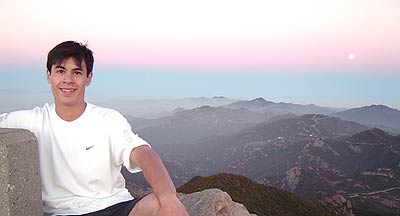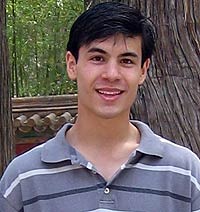UC Berkeley Web Feature
 |
Tanguy Chau, a finalist for the University Medal, majored in chemical engineering but still managed to spend a lot of time outdoors. This photo was taken after a trail run with his girlfriend in California's Santa Monica Mountains, before he moved to Shanghai. (Photos by Terri Wong) |
Getting to Berkeley wasn't smooth sailing for polyglot chemistry whiz Tanguy Chau
BERKELEY – In the summer of 2000, when 17-year-old Tanguy Chau moved to California from Belgium, he was fluent in French and Dutch - and just about every chemistry "dialect" - but not English. In fact, his grasp of English skills was so rudimentary that he had flunked the language proficiency test required to apply to UC Berkeley, where he'd always wanted to study. That, however, was probably the last test that Chau ever performed poorly on.
 The University Medal The University MedalEstablished in 1871 by California Governor Henry Huntly Haight, the University Medal honors UC Berkeley's most distinguished graduating senior. Three to five students finalists are also named. Three previous winners have returned their medallions, then made of 14-karat gold, to Berkeley as gifts. The last to do so was Clothilde Grunksy Taylor '14, as a 90th birthday present to herself in 1981: "I received so much from the university — I had a wonderful time there — and I wanted to give a little of it back," said Taylor. Having appreciated in value 100 times, the medal was worth $4,000.  The 2005 Medalist: Alejandra
Dubcovsky, scholar
of slave letters, wins University Medal The 2005 Medalist: Alejandra
Dubcovsky, scholar
of slave letters, wins University Medal
The Finalists
|
"I wanted to win for the College of Chemistry, to give something back to all the people who helped me," Chau says over an echoing, long-distance computer connection from Shanghai, where he is working as a researcher for a U.S. startup called Accelergy. "But I'm just really, really excited to have been in the running."
Chemistry to spareChau's first name is pronounced TAHN-ghee, as it would be in French, although "as long as people don't call me 'tan guy,' like I'm a surfer dude, whatever is OK," says this easygoing son of a French mother and a Vietnamese war-refugee father.
Chau fell in love with chemistry early, as a young boy growing up in the French-speaking part of Belgium. He found a chemistry kit that his mother, a dentist, had stashed in the attic, and started playing with it in secret. "I would just mix whatever, very colorful and very beautiful," he recalls. "It's not very safe, not a good recommendation, but that's how I got interested in chemistry."
Chemistry, in turn, planted the idea of Berkeley in Chau's mind. "Berkeley is all over the periodic table," he says. (Many elements were discovered and named by Berkeley scientists, including Berkelium and Seaborgium.) "It was always my dream to go there."
Chau's high school chemistry teacher encouraged his interest, and on his own he started reading books on inorganic, organic, nuclear, and biological chemistry. He began entering and winning chemistry contests, was selected as the Belgian National Laureate in 1999, and in his last year of high school represented Belgium in the International Chemistry Olympiad. When he wasn't in the lab, he was sailing for fun as well as glory: he competed for Belgium in the European Sailing Championship and sailed individually for Belgium's National Sailing Team. At Berkeley, he sailed when he could, but he also went mountain biking, rock climbing and swimming regularly, and skiing when he could afford it.
Thinking about thingsWhen he first started class at De Anza, Chau was completely lost: "The first day of class, I was like, 'Wow, they really do speak English here!'" He started on the school's English-as-a-second-language track, but found that he was learning English faster through the subjects he already knew: math and chemistry. As his English improved he began tutoring, and later won several scholarships, including the National Engineering Honor Society Tau Beta Pi, Chevron-Texaco, and McDonald scholarships.
 'You don't need a lot of things to be happy in life. In reality, it's more about human contact.' -Tanguy Chau |
His time in Vietnam made a deep impression on Chau. "Working in Vietnam gave me a different perspective, about how people can be happy with so little," he explains. "You don't need a lot of things to be happy in life. In reality, it's more about human contact."
Chau went back to Asia for the following summer, this time in a paid research position at Tsinghua University, one of China's top schools. After Vietnam, he had taken two semesters of Mandarin and become reasonably proficient in this extremely difficult language. As is typical for Chau, he is modest about the accomplishment. "The language program at Berkeley is amazing," he says. "The structure that they use is excellent."
At the lab in Tsinghua, using skills he'd honed doing research on catalysts in chemistry professor Alex Bell's lab, Chau automated their manual data collection process, taught the researchers how to write their own automation programs, and figured out how why one nano-catalyst had a particularly low yield. Just par for the course for this "brilliant and multifaceted young man," as Bell described him in his recommendation letter for the University Medal.
Asked what advice he would give to incoming freshmen, Chau emphasizes the importance of spending time outside the U.S., and immersing oneself in a different culture. "The important thing is to see how people live, how people who don't have much are happy," he says. He also urged new students to open up their minds and not just take classes in their major, but look into completely different fields. "Sometimes the classes that you enjoy the most are not the ones you thought you would be interested in," he says, noting that when he came to Berkeley he had never thought he would study Chinese.
Chau plans to stay in China for a year before returning to the States to get a joint MBA and Ph.D. in engineering. Ultimately, he'd like to start a business that will benefit others through some combination of technological and scientific advancement. Which form of technology advancement he will work with, he's not sure.
"I just have to walk the road and see what's next," he says from his office in Shanghai, 6,000 miles and 15 hours away. For Chau, there are bound to be many more twists and turns in his future.


 Getting to Berkeley wasn't smooth sailing for polyglot chemistry whiz Tanguy Chau
Getting to Berkeley wasn't smooth sailing for polyglot chemistry whiz Tanguy Chau Math major and former DeCal director Nate Singer leaves Berkeley a richer place
Math major and former DeCal director Nate Singer leaves Berkeley a richer place Computer science major David Sontag juggles both artificial and human intelligence
Computer science major David Sontag juggles both artificial and human intelligence In defending the Earth, Denise Grab
finds a way to combine her lifelong passions
In defending the Earth, Denise Grab
finds a way to combine her lifelong passions Anthropology major Kelly Fong reconstructs the Asian immigrant experience
Anthropology major Kelly Fong reconstructs the Asian immigrant experience